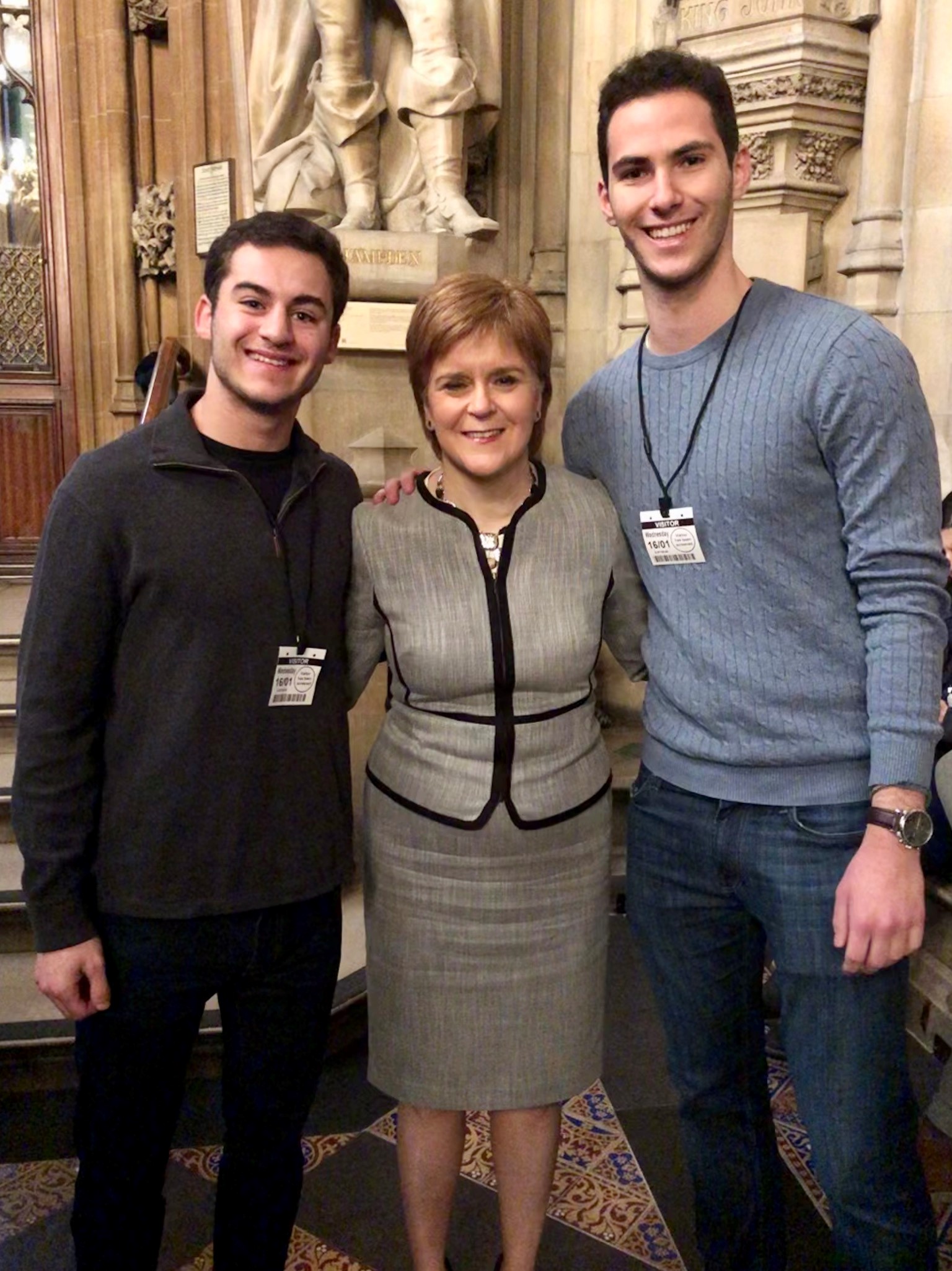UKExit and a Divided Government
By: Spencer Kersh, CAS ’20 and Samuel Roth, Wharton ’20

Samuel Roth (Left) and Spencer Kersh (Right) with Scottish First Minister Nicola Sturgeon
Semester Abroad – London
The day after the historic vote in which Prime Minister Theresa May’s UKExit deal was rejected by 230 votes—the largest defeat for a sitting government in the history of the United Kingdom—we attended Prime Minister’s Questions (PMQs). Each Wednesday at noon (GMT), the Prime Minister spends nearly an hour answering questions from Members of Parliament (MPs), most notably the Leader of the Opposition. Notoriously difficult for non-UK citizens to attend (tickets are assigned to UK citizens through their MPs, but if they do not show up at PMQs, the tickets are given to those waiting outside the gallery), we arrived over two hours early with the hope that we would be given two tickets.
Perhaps one of the most exciting parts of our visit to Parliament came while we waited in the queue, as the leadership of the Scottish National Party (SNP), First Minister Nicola Sturgeon, walked past us on their way into the gallery. We spoke and took a photo with Minister Sturgeon for a few minutes, and she seemed very impressed that two American university students were trying to attend such a historic day of PMQs.
After two hours of waiting, we received the last two tickets to gain access to the gallery. We followed the crowds to the public seating section, located on the second level of the House of Commons. After several questions for the Scottish Secretary of State David Mundell, Theresa May and Labour Party (Opposition) leader Jeremy Corbyn entered the House. During their charged 15-minute exchange, May and Corbyn combatted on how to proceed with UKExit negotiations after the government’s defeat, whether Theresa May should resign, and Corbyn’s unwillingness to define his UKExit strategy.
MPs from May’s Conservative Party, Corbyn’s Labour Party, and the SNP asked the Prime Minister questions for the next 35 minutes. Coming from a country divided along partisan lines, it was fascinating to witness a similar phenomenon in these questions. Conservative MPs avoided criticizing their party’s leader on the failed vote the previous night, instead highlighting efforts to increase National Health Service (NHS) spending, eliminate absolute poverty in the UK, and attract foreign investment in the energy sector. Labour and SNP MPs, on the other hand, solely focused on the historic UKExit vote, questioning Theresa May’s ability to lead the country properly.
Perhaps most fascinating about our experience at PMQs was witnessing a divided government approaching an important crossroad. From our time in London, we’ve realized that this government represents and faces extreme pressure from a divided populace. Opinions about remaining in or leaving the European Union remain strong, especially at such international universities as the London School of Economics and University College London. Attending PMQs has perfectly set the stage for the next few months, as we are sure there will be more monumental events in this saga.
Note: Thank you to Professor Brendan O’Leary (Penn Political Science) for pointing out in our European Union class this past semester that this process, in which the United Kingdom exits the European Union, should be called UKExit, not Brexit, as it is the entirety of the UK that plans to leave the EU, not just Great Britain.
The Semester Abroad (SA) program offers undergraduate students the opportunity to study in a new global community through extended study for a semester or year. Penn Abroad partners with top institutions around the globe and collaborates with Penn’s undergraduate schools to offer programs for students across academic disciplines.